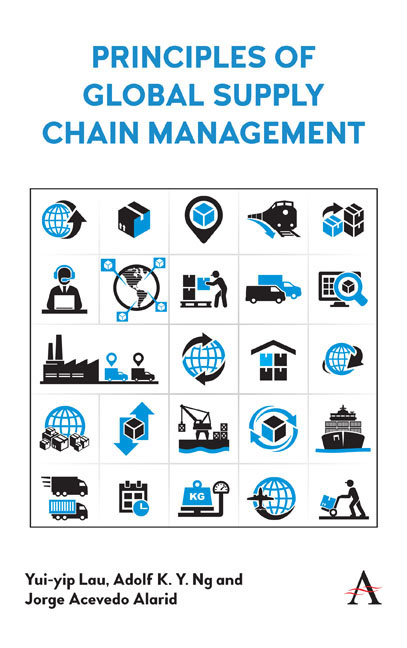Book contents
- Frontmatter
- Contents
- List of Figures
- List of Tables
- Foreword
- Preface
- About the Authors
- 1 Introduction
- 2 Managing Outbound Logistics and Distribution
- 3 Supplier Selection and Procurement
- 4 Warehouse Management
- 5 Case Studies in Food Supply Chains
- 6 Inland Ports in Global Supply Chains
- 7 Climate Change in a Global Environment
- 8 Sustainability in Infrastructure-Based Supply Chains
- 9 Reverse Logistics
- 10 Logistics Associations
- 11 Logistics Education
- 12 Case Exercises in Global Supply Chains
- Appendix
- Index
7 - Climate Change in a Global Environment
- Frontmatter
- Contents
- List of Figures
- List of Tables
- Foreword
- Preface
- About the Authors
- 1 Introduction
- 2 Managing Outbound Logistics and Distribution
- 3 Supplier Selection and Procurement
- 4 Warehouse Management
- 5 Case Studies in Food Supply Chains
- 6 Inland Ports in Global Supply Chains
- 7 Climate Change in a Global Environment
- 8 Sustainability in Infrastructure-Based Supply Chains
- 9 Reverse Logistics
- 10 Logistics Associations
- 11 Logistics Education
- 12 Case Exercises in Global Supply Chains
- Appendix
- Index
Summary
Ports are increasingly influenced by the impacts posed by climate change. As they are critical nodes for international trade and shipping, it has brought notable implications for human welfare and the global economy. Hence, the time has come for a paradigm shift on how ports plan for and perform new strategies. In this chapter, we will achieve the following objectives:
• understand the relationships between climate change and sustainability of supply chains;
• provide discussions on the theoretical framework of institutions and institutional systems;
• present the experiences of climate change adaptation planning for ports of San Diego (United States) and Vancouver (Canada);
• learn about institutional theory and initiate new thought in planning and decision- making.
Introduction
Climate change is at the forefront due to the potential catastrophic risks posed to human lives and activities (Keohane and Victor, 2010; UNECE, 2010; Intergovernmental Panel on Climate Change, 2012). Schaeffer et al. (2012) warn that by 2100, sea levels may be up to 80 centimeters than what they are today. It is too late to avoid all the deleterious effects of climate change, in no small part due to uncertainties on how the problem should be addressed (Applegate, 2010). Thus, adaptation is not a choice but a necessity. In this case, supply chains are especially vulnerable to such risks. Despite strong evidence suggesting that institutional systems influence climate change adaptation due to ambiguity and competing political interests (Wheeler et al., 2009; Keohane and Victor, 2010; Preston et al., 2011; Osthorst and Manz, 2012), most attention focuses on physical and technical details of capitalintensive engineering projects, for example, elevation, levee, dykes and so on (National Research Council of the USA (NRC), 2010a). Adaptation is still not adequately investigated, especially in terms of the reduction of uncertainty in decision- making, public policy, and institutional practice. Indeed, the sustainability of supply chains depends on the extent to which supply chain facilities and infrastructures can adapt and remain resilient to climate change impacts.
Understanding such, this chapter dissects the dilemmas of climate adaptation planning. It investigates whether climate change adaptation has catalyzed a transformation of the nature and practice of planning. Two port cases, namely, San Diego (United States) and Vancouver (Canada), are used in our discussions. Ports are appropriate targets for illustrative purpose as they play important roles in affecting the efficiency of supply chains (Ng and Liu, 2014).
- Type
- Chapter
- Information
- Principles of Global Supply Chain Management , pp. 101 - 114Publisher: Anthem PressPrint publication year: 2019



